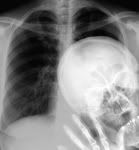Work Hours, Sleep and Patient Safety in Residency Training
Recently I read a disconcerting article on sleep (or really, sleep deprivation) and residency: Work Hours, Sleep and Patient Safety in Residency Training by Charles A Czeisler, Ph.D., M.D. Ever wonder why we'll have to work such long hours during residency? Here's an excerpt from the article:
Extended duration work shifts, like many other features of graduate medical education in the United States, were the product of the postgraduate medical education curriculum developed by William Steward Halsted, M.D. Professor Halsted, who was Surgeon-in-Chief at the Johns Hopkins Hospital, was internationally renowned for his innovations in medical education. He founded the surgical training program at the Johns Hopkins Hospital in the 1890s, which served as a model for postgraduate medical education. He required physicians-in-training to live in the hospital (they were quite literally residents) and discouraged them from marrying so that they could devote themselves to medicine. He required residents to be on a “q1” call schedule, i.e. they were on call 362 of 365 days per year. He taught devotion to the profession by example, working heroic hours with his trainees. Only recently was it revealed how he maintained this grueling sleep-deprived schedule. Professor Halsted was in fact addicted to cocaine, an addiction that was an unfortunate by-product of his pioneering work developing cocaine as a surgical anesthetic. He spent more than a year in a rehabilitation program at a Rhode Island hospital trying to shed his cocaine addiction prior to his appointment as the first Professor of Surgery at Johns Hopkins Medical School. However he only gained an addiction to morphine there, which had been used to treat his cocaine addiction.
It's a very long article, so if you don't have the time or inclination to read the whole thing, here's the summary at the end:
The work schedules of physicians in training require them to work extraordinarily long work shifts and long work weeks. These schedules, which are based on a tradition that dates back to the 19th century, result in acute and chronic sleep deprivation. Sleep deprivation, misalignment of circadian phase and sleep inertia adversely impact cognitive performance and increase the risk of error and accident. Interns working extended duration shifts make significantly more serious medical errors while caring for patients in intensive care units, and make five times as many serious diagnostic mistakes. In addition to the deleterious effects of extended duration work shifts on patient safety, we also found that the risk of motor vehicle crashes is more than doubled driving home from work after such shifts. We conclude that the practice of working extended duration work shifts, which continues to be allowed by new ACGME regulations, are hazardous to both interns and their patients. Academic medical centers are urged to eliminate this now-dangerous tradition.
Something to think about. Yes, I plan to "suck it up" like everyone else and work my tail off during residency. But I'm convinced that in spite of the work-hour reforms of 2003, there is still room for improvement.
If you ever feel powerless, future doctors, remember that famous quote by Margaret Mead: "Never doubt that a small group of thoughtful, committed people can change the world. Indeed, it is the only thing that ever has."



